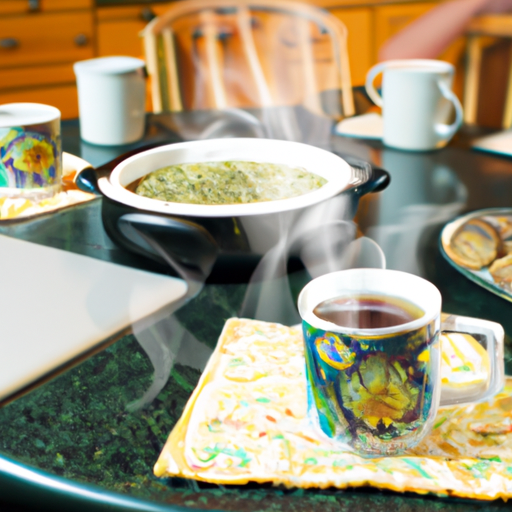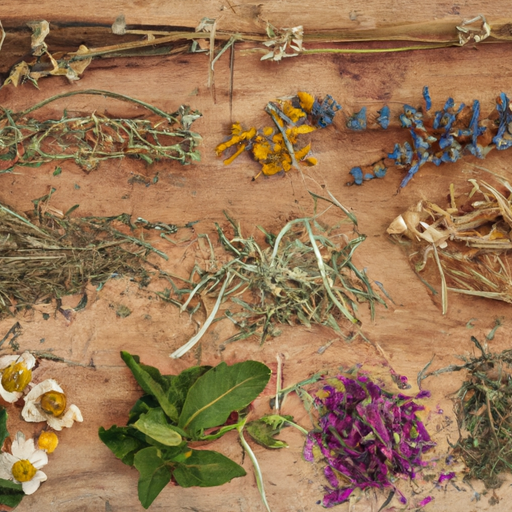Explore the Pleasant Protection of Herbal Tea against COVID-19
As a tea enthusiast, I am thrilled to share the exquisite elixirs that nature has bestowed upon us to combat the dreaded COVID-19. In these uncertain times, it is crucial to turn to holistic remedies that can bolster our immune systems and provide a sense of well-being.
Herbal teas, infused with the power of plants and their healing properties, have long been cherished for their ability to support our health and vitality.
Let us embark on a journey of taste and resilience as we explore the enchanting world of herbal teas that may help us in the fight against COVID-19.
Echinacea tea, renowned for its immune-boosting qualities, can be a powerful ally in shielding us from illness.
The zesty warmth of ginger tea not only comforts our souls but also provides anti-inflammatory benefits.
Elderberry tea, brimming with antioxidants, may aid in reducing the severity and duration of symptoms.
Peppermint tea, with its refreshing and soothing qualities, can help alleviate respiratory discomfort.
Join me on this natural quest as we delve into the wonders of chamomile, lemon balm, and green tea, each with their unique contributions to our well-being.
Together, let us embrace the healing powers of herbal tea and fortify our bodies against the challenges that lie ahead.
Key Takeaways
- Echinacea tea stimulates the immune system and promotes white blood cell production.
- Ginger tea has anti-inflammatory benefits, supports respiratory health, and relieves congestion.
- Elderberry tea is rich in antioxidants, reduces the severity and duration of symptoms, and boosts the immune system.
- Green tea is packed with antioxidants, supports overall health, strengthens the immune system, and offers different flavors (sencha, matcha, jasmine).
Echinacea Tea
If you’re looking for a herbal tea to boost your immune system during these challenging times, echinacea tea is perfect for you! Echinacea tea has long been hailed for its potential immune-boosting properties. Research suggests that echinacea may help stimulate the immune system, promoting the production of white blood cells that fight off infections.
However, it’s important to note that the evidence is not conclusive and more research is needed to fully understand the effects of echinacea on the immune system. Additionally, it’s crucial to be aware of potential side effects when consuming echinacea tea during COVID-19. Some individuals may experience allergic reactions or digestive issues. Therefore, it’s always best to consult with a healthcare professional before incorporating echinacea tea into your routine.
Now, let’s move on to the next herbal tea option, ginger tea!
Ginger Tea
Indulge in a soothing cup of ginger-infused brew to boost your wellness. Ginger tea is not only delicious, but it also offers numerous health benefits, especially during the cold and flu season. This natural remedy is known for its ability to support respiratory health and relieve congestion. To make a soothing ginger tea, start by boiling water and adding fresh ginger slices or ginger tea bags. Let it steep for about 10 minutes, then strain and enjoy the warm, aromatic goodness. The spicy flavor of ginger combined with its anti-inflammatory and antioxidant properties can help alleviate symptoms of respiratory infections.
Incorporating ginger tea into your daily routine can be a simple and effective way to promote overall well-being. Now, let’s move on to the next herbal tea, which is elderberry tea.
Elderberry Tea
Sip on a cup of comforting elderberry tea and experience the delightful combination of flavors that’ll captivate your taste buds.
Not only does elderberry tea provide a soothing and aromatic experience, but it also offers numerous health benefits, especially during cold and flu season.
Packed with antioxidants and vitamins, elderberry tea can help boost your immune system and fight off infections.
To make elderberry tea at home for immune support, simply simmer dried elderberries in water for about 15 minutes, strain, and enjoy hot or cold. You can also add honey or lemon for added flavor and additional health benefits.
Transitioning into the subsequent section about peppermint tea, let’s explore another herbal tea that offers its own unique set of benefits.
Peppermint Tea
Immerse yourself in the invigorating and refreshing essence of peppermint tea, allowing its vibrant flavors to awaken your senses and provide a rejuvenating experience. Peppermint tea is not only a delightful and soothing drink but also offers numerous health benefits. It has been used for centuries to aid digestion, relieve headaches, and alleviate symptoms of the common cold. The menthol in peppermint helps to soothe the muscles of the gastrointestinal tract, reducing bloating and indigestion. Additionally, it has antimicrobial properties that can help fight off bacteria and viruses, making it a perfect choice during the cold and flu season. To make a refreshing peppermint tea blend, simply steep a handful of fresh peppermint leaves in hot water for about 5-10 minutes. Add a squeeze of lemon or a touch of honey for added flavor. Transitioning to the subsequent section about chamomile tea, it is another herbal tea that offers a range of health benefits.
Chamomile Tea
Chamomile tea, renowned for its soothing and calming properties, offers a myriad of health benefits that extend beyond relaxation. Here are three reasons why you should incorporate chamomile tea into your daily routine:
-
Digestive Health: Chamomile tea has been used for centuries to alleviate digestive issues such as bloating, indigestion, and stomach cramps. It’s anti-inflammatory properties help to calm the digestive system and promote healthy gut function.
-
Sleep Aid: Drinking chamomile tea before bed can help improve sleep quality. Its natural sedative properties relax the mind and body, making it easier to fall asleep and stay asleep throughout the night.
-
Immune Support: Chamomile tea is packed with antioxidants that help strengthen the immune system. Regular consumption can help protect against infections and reduce inflammation in the body.
To make chamomile tea at home, simply steep dried chamomile flowers in hot water for about 5 minutes. Add honey or lemon for a touch of sweetness, if desired.
Now, let’s move on to the next section and explore the health benefits of lemon balm tea.
Lemon Balm Tea
Invigorate your senses with the refreshing and uplifting benefits of lemon balm, as it brings a burst of natural energy to your daily routine. Lemon balm tea, derived from the leaves of the lemon balm plant, offers numerous health benefits, particularly for stress relief. It contains compounds that promote relaxation, reduce anxiety, and improve sleep quality. This herbal tea has been used for centuries to calm the mind and ease tension, making it an excellent choice for those seeking a natural way to unwind.
To make lemon balm tea at home, simply steep a handful of fresh lemon balm leaves in hot water for about 5-10 minutes. You can also add a teaspoon of honey for added sweetness. The aromatic blend of citrus and herbal notes will leave you feeling refreshed and rejuvenated.
Transitioning to our next topic, green tea offers a myriad of health benefits as well.
Green Tea
Discover the invigorating power of green tea and how it can elevate your well-being, bringing a wave of natural energy and a myriad of health benefits to your daily routine. Green tea is renowned for its numerous health benefits. Packed with antioxidants, it supports overall health and strengthens your immune system, making it an excellent choice during these challenging times.
One of the great things about green tea is the variety of flavors it offers. From delicate and grassy to bold and vegetal, there’s a type of green tea to suit everyone’s palate. Sencha, for example, is a popular Japanese green tea known for its refreshing taste, while matcha, a powdered green tea, has a rich and creamy flavor. Jasmine green tea, on the other hand, combines the floral aroma of jasmine flowers with the smoothness of green tea, creating a delightful sensory experience.
Incorporating green tea into your daily routine not only provides a delicious and refreshing beverage, but it also brings a range of health benefits. So why not indulge in a cup of green tea and experience its vitality-boosting effects?
Frequently Asked Questions
Can herbal teas like Echinacea or Ginger tea cure COVID-19?
While herbal teas like echinacea and ginger may have benefits for respiratory health, there is no evidence to suggest that they can cure COVID-19. It’s important to rely on proven medical treatments and follow guidelines from health authorities.
Are there any side effects of consuming Elderberry tea for COVID-19 prevention?
There may be potential side effects of consuming elderberry tea for COVID-19 prevention. Research suggests it can stimulate the immune system, but excessive consumption may cause digestive issues. It is important to consult a healthcare professional for personalized advice.
How does Peppermint tea help boost the immune system against COVID-19?
Peppermint tea benefits overall health by promoting digestion and reducing inflammation. It contains antioxidants that help boost the immune system. While there is no specific evidence linking peppermint tea to COVID-19 prevention, a healthy immune system is important for overall well-being.
Can Chamomile tea be used as a substitute for medical treatment for COVID-19?
Chamomile tea has various health benefits, like reducing anxiety and improving sleep. However, it cannot be used as a substitute for medical treatment for COVID-19. It is recommended to follow medical advice and guidelines. Remember, chamomile tea dosage should be moderate for optimal results.
Is it safe to consume Green tea alongside COVID-19 vaccines or medications?
It is generally safe to consume green tea alongside COVID-19 vaccines or medications. However, it is always best to consult with healthcare professionals to ensure there are no specific interactions or contraindications.
Conclusion
In conclusion, when it comes to finding natural remedies to support our well-being during these challenging times, herbal teas can be a soothing and beneficial choice.
Echinacea tea, with its immune-boosting properties, can help us stay resilient.
Ginger tea, known for its anti-inflammatory effects, can provide relief and comfort.
Elderberry tea, packed with antioxidants, may contribute to our overall health.
Peppermint tea, chamomile tea, and lemon balm tea can all aid in relaxation and provide a sense of calm.
Lastly, green tea, with its numerous health benefits, can be a refreshing and invigorating option.
Embracing these herbal teas can be a holistic and evidence-based approach to supporting our well-being naturally.










